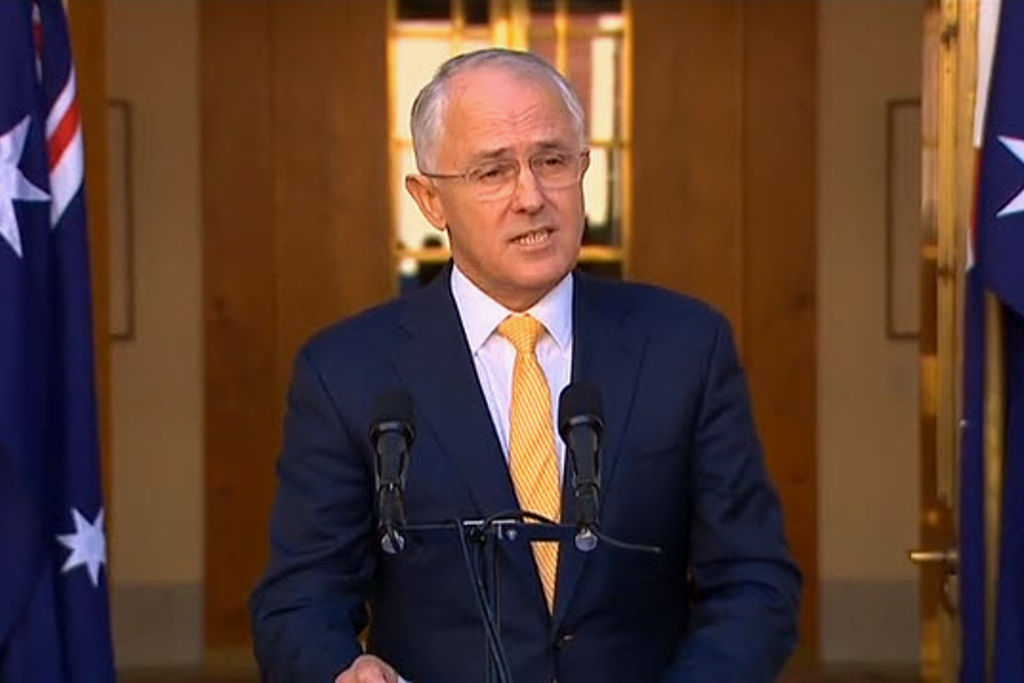Junk Explained: Why Are We Having A 75-Day Election Campaign, Dear God, Why
This is going to be ~~~fun~~~.

Update, April 20: This article is an updated version of a March piece about things we could be doing instead of a super-long election campaign. We were so innocent then.
–
Yesterday, Prime Minister Malcolm Turnbull finally bit the bullet and confirmed that a double-dissolution election will be held on July 2, or precisely 75 days from his announcement.
Prime Minister @TurnbullMalcolm says he ‘expects’ a July 2 election #auspol https://t.co/kekxFMlJzx https://t.co/xmkODv2zyf
— ABC News (@abcnews) April 19, 2016
There’s a whole lot to think about from that news, but the upshot is that we’re staring down the barrel of a 75-day election campaign — the longest in Australian political history, by far. To put that in perspective, remember the last election campaign? The one described by former Labor minister Barry Jones as “the worst in our modern history for the debased quality of political discourse”? The one dominated by three-word slogans, relentless negativity, campaign stunts, bizarre photo opportunities, debates entirely devoid of substance and ambition, and Clive Palmer?
That campaign — from the time Kevin Rudd called an election on August 4 to the election itself on September 7 — went for 34 days, or just over a month. Multiply that by two-and-a-bit, add a big old dose of Malcolm Turnbull saying “innovation” over and over like a tech bro caught in a feedback loop, make the alternative Prime Minister someone whose most newsworthy moment in months was talking about different types of lettuce, and factor in Tony Abbott popping his shiny reptilian head up and spraying destabilising nonsense everywhere on a regular basis, and you’re beginning to see the true horror of what we, as a country, are about to face.
But before you zonk out to the tune of grey-faced men in expensive suits saying “we care about jobs” until the sun implodes, it’s worth taking a minute to go over the basics — why everyone thinks a double dissolution election is so special, and why we’re having one. Strap in, Australia.
–
What Is The ABCC And Should I Care, Even
According to Turnbull, the reason we need a special early election is so the government can bring back the Australian Building and Construction Commission, or ABCC, if it wins another term. The ABCC was first introduced by John Howard in 2005, and was repealed by the Labor government in 2012. Turnbull’s called a double dissolution because the Senate has voted to reject bringing back the ABCC twice now, and apparently it’s such an important issue it can’t wait any longer — he even recalled Parliament to vote on the issue earlier this month.
If you’re wondering what the hell an obscure, defunct building commission has to do with the price of eggs, you’re not alone. Most voters have no idea what the ABCC even is or does, let alone whether or not it’s a good idea, and they definitely don’t think it’s the most important issue of the election. But for construction workers and the broader labour movement, the prospect of the ABCC coming back is a nightmare, which is why they’re releasing ads like this with dramatic string music and phrases like ‘ICE DEALERS’ in massive letters.
Basically, the ABCC was a watchdog that policed what Howard described as “militarism and illegality” in the building industry, especially by the Construction, Forestry, Mining and Energy Union (CFMEU). The CFMEU are the tradies’ union — if you have a picture in your head of union workers as big, boofy, sweaty blokes in hard hats, the CFMEU is where that image comes from. On the face of it, there are good grounds to poke around in the CFMEU’s closet to see if any skeletons fall out; union members and leaders have periodically been investigated on charges of corruption, bribery, threats of violence against investigators and connections to organised crime.
The Liberals reckon all those shenanigans are wreaking havoc on the industry, and the ABCC needs to be brought back to smoke them out. But there’s serious doubt about whether the ABCC is the right way to do that. The first time round, it had a negative impact on construction productivity, and work-related injuries and fatalities on building sites went up until its abolition in 2012.
A revived ABCC would also have hugely coercive powers that have raised red flags with lawyers’ and civil rights groups and may even be in breach of UN labour rights provisions. People on the ABCC’s radar wouldn’t have the right to silence or to pick their own lawyer, and would face massive fines and jail time for not complying. The government’s hoping to supersize the ABCC too, giving it the power to investigate the transport, manufacturing and warehousing industries.
That’s why, despite their jobs being on the line, half of the crossbench voted with Labor and the Greens on Monday to knock back a bill that would’ve brought the ABCC back to life. Hence, why we’re going to a double dissolution on July 2.
‘But what’s that?” I hear you conveniently say. I’m glad you asked, imaginary person who just provided me with a segue! Have a gif of Daryl Braithwaite leaping like he’s in a Toyota commercial during his Aussie rock classic ‘Horses’ as a reward for making this far.

This is…mesmerising.
–
What Is A Double Dissolution Election And Should I Care, Even
A rare event in Australian politics, a double dissolution election is the political equivalent of CTRL+ALT+DELing the entire Parliament. It’s only used by governments as a measure of last resort if they have major trouble getting their policies through the Senate, which the Abbott/Turnbull government has definitely had. It’s called a “double dissolution” because both Houses of Parliament get “dissolved” (not in battery acid, sadly) and voted on.
Crucially, unlike most elections, in which only half the Senate is up for re-election at any one time, a double dissolution election puts every seat in the Senate up for grabs. Senators normally only face election once every six years, as opposed to Representatives, who are up every three. In real terms, a double dissolution election in 2016 could mean those pesky crossbench Senators the government’s had such trouble with over the last few years, like Ricky Muir, Glenn Lazarus and Jacqui Lambie, out of a job in a few months. If Turnbull decided to hold a regular election, he’d still be stuck with half that uncooperative Senate afterwards no matter how well he did. This way, he’s got an opportunity to boot them all out in one fell swoop and hopefully get a Senate that’s a little friendlier to the government’s agenda.
But it’s a risky move for the government too; double dissolution elections are unpredictable, and Turnbull might have bitten off more than he can chew. Strong polling for the Greens, the Nick Xenophon Team in South Australia and even a few minor party independents like Lambie and Lazarus could see a new Senate more hostile to the government than the one we have now.
Even worse for Turnbull, the election’s looking to be way, way closer than anyone thought just six months ago when he took the top job. A close result, combined with a bunch of unpredictable lower house seats in South Australia thanks to Nick Xenophon running candidates and the very real prospect of Barnaby Joyce losing in New England, and we could have an indecisive result in the House of Reps too, just like when Julia Gillard barely scraped back in as PM in 2010.
Or he could win by heaps, who the hell knows. I once confidently wrote that Donald Trump’s Presidential run would be a huge funny joke, and look how that turned out. The moral of the story is: never trust anyone who tells you they can predict politics. We are all idiots.

Pictured: all political “analysts” everywhere, all the time.
That’s it! You made it all the way to the end! If reading about all this was confusing, frustrating and soporific, take comfort in the fact that we only have to do this 74 more times in a row. Yes, you have permission to walk into the sea. Off you go.